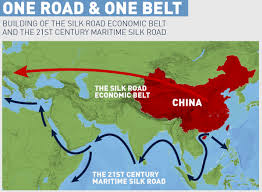It is not just China but other countries which see the opportunities provided by the Belt and Road Initiative, as it could play a major role in revitalising the struggling world economy. “Pakistan, Saudi Arabia, Russia and the Central Asian republics have all started to think about their economic futures in terms of these connections. You get leaders in the Saudi Arabian press are talking about the new silk roads and how Saudi Arabia fits into this,” according to an article by Peter Frankopan, director of the Centre for Byzantine Research at Oxford University, published in ‘China Daily’ on Sunday. The academic opined, China’s reaching out through the initiative comes at a time when the United States is talking the language of isolationism and protectionism. “What everyone is waiting to see is whether the rhetoric and language of American isolationism becomes a fact,” he said. “If these signals are right and America is pulling back, then China’s fostering of new links, particularly with countries with which it borders on the West, gains greater significance,” he added
Terming the Belt and Road Initiative a ‘global growth engine, the best-selling author and academic Frankopan said that China with its Belt and Road Initiative – one of the government’s key strategies discussed at the two sessions, is revitalising what could be a major new axis for world trade.
He said the Silk Roads could provide the global economy with a new much-needed growth engine. “The reason why there is so much excitement about these routes is because they have existed before. You only have to look back in history to see how all these connections and pathways were made,” he added. “If they have existed before it can work again. It will lead to a greater level of ease of distributing goods and services along the routes which will make the whole process cheaper and quicker.” The Belt and Road Initiative consists of the Silk Road Economic Belt and the 21st-century Maritime Silk Road.
More than 30 countries along the routes have signed cooperative agreements with China. Last year, Chinese companies invested $14.5 billion in markets along with them. Zong Qinghou, deputy to the National People’s Congress and chairman and general manager of Hangzhou Wahaha Group, China’s largest soft drinks maker said, “The new routes under the Belt and Road Initiative have provided opportunities not just for the Chinese companies but for the local businesses too. The Belt and Road countries are full of business opportunities and development potential. Investment in the countries and regions is not only able to help the development of local economies, but also promote the transformation of the domestic industry,” he added.




